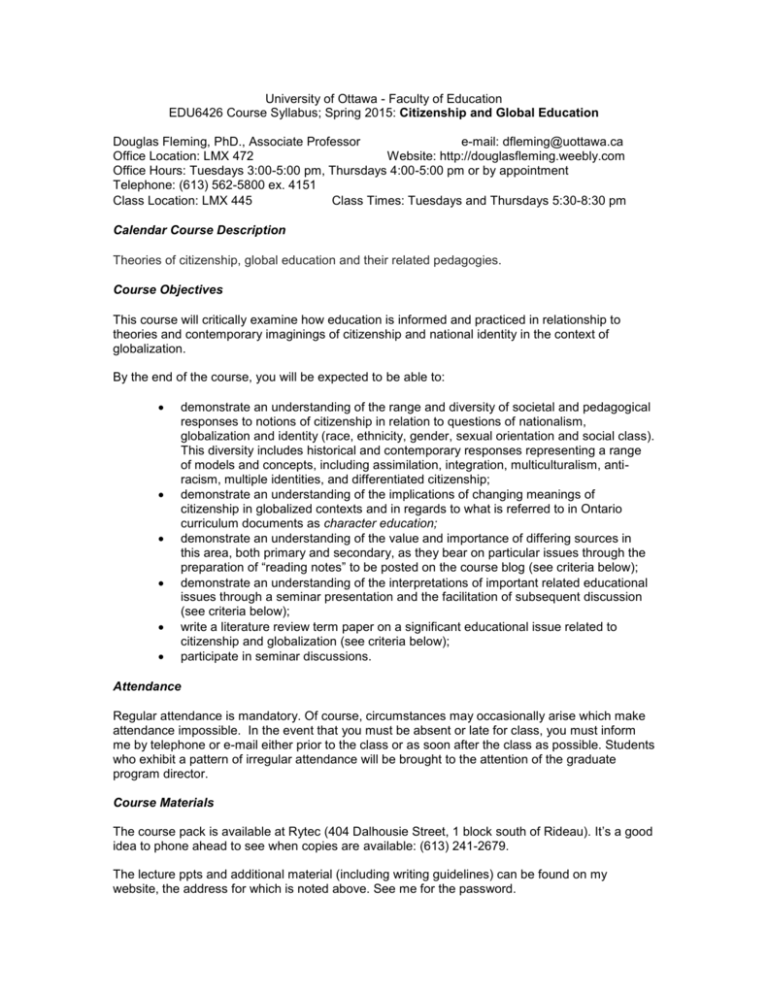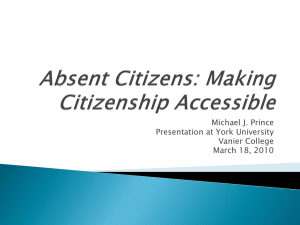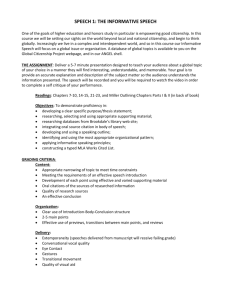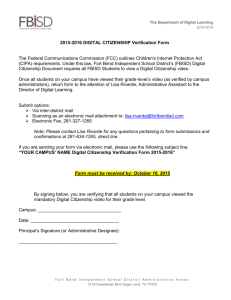File - Douglas Fleming, PhD. - Home
advertisement

University of Ottawa - Faculty of Education EDU6426 Course Syllabus; Spring 2015: Citizenship and Global Education Douglas Fleming, PhD., Associate Professor e-mail: dfleming@uottawa.ca Office Location: LMX 472 Website: http://douglasfleming.weebly.com Office Hours: Tuesdays 3:00-5:00 pm, Thursdays 4:00-5:00 pm or by appointment Telephone: (613) 562-5800 ex. 4151 Class Location: LMX 445 Class Times: Tuesdays and Thursdays 5:30-8:30 pm Calendar Course Description Theories of citizenship, global education and their related pedagogies. Course Objectives This course will critically examine how education is informed and practiced in relationship to theories and contemporary imaginings of citizenship and national identity in the context of globalization. By the end of the course, you will be expected to be able to: demonstrate an understanding of the range and diversity of societal and pedagogical responses to notions of citizenship in relation to questions of nationalism, globalization and identity (race, ethnicity, gender, sexual orientation and social class). This diversity includes historical and contemporary responses representing a range of models and concepts, including assimilation, integration, multiculturalism, antiracism, multiple identities, and differentiated citizenship; demonstrate an understanding of the implications of changing meanings of citizenship in globalized contexts and in regards to what is referred to in Ontario curriculum documents as character education; demonstrate an understanding of the value and importance of differing sources in this area, both primary and secondary, as they bear on particular issues through the preparation of “reading notes” to be posted on the course blog (see criteria below); demonstrate an understanding of the interpretations of important related educational issues through a seminar presentation and the facilitation of subsequent discussion (see criteria below); write a literature review term paper on a significant educational issue related to citizenship and globalization (see criteria below); participate in seminar discussions. Attendance Regular attendance is mandatory. Of course, circumstances may occasionally arise which make attendance impossible. In the event that you must be absent or late for class, you must inform me by telephone or e-mail either prior to the class or as soon after the class as possible. Students who exhibit a pattern of irregular attendance will be brought to the attention of the graduate program director. Course Materials The course pack is available at Rytec (404 Dalhousie Street, 1 block south of Rideau). It’s a good idea to phone ahead to see when copies are available: (613) 241-2679. The lecture ppts and additional material (including writing guidelines) can be found on my website, the address for which is noted above. See me for the password. 2 Expectations All of us in the class are professionals and deserve to be treated as colleagues. I want to stress that mutual respect as paramount. Language or behavior that is racist, sexist, or otherwise not inclusive will not be tolerated and will be brought to the attention of the Dean or his designates. Respect should be shown both in-class and within blog contributions. Course Schedule and Required Readings All readings, with the exception of electronic sources, are contained in the course pack in the order listed below. Additional activities, on-line readings, videos and lectures will be added as needed or as time permits. Changes to this schedule may be made, as circumstances require. You will be expected to have thoroughly read and be prepared to discuss the required readings (or excerpts thereof) from the course pack in advance for each week’s class. Class 1 May 5 Class 2 May 7 Class 3 May 12 Basic Concepts: Citizenship Course introduction and syllabus Ice-breaker ‘Mini-lecture’ 1: Jus Sanguinis and Jus Soli Conceptions of Citizenship Basic Concepts: Globalization ‘Mini-lecture’ 2: Competing Notions of Globalization Readings to be discussed: Pike, G. (2008). Peddling humbug and false piety: Reflections on the road to educating global citizens. In A. Abdi & G. Richardson (Eds.). Decolonizing democratic education (pp.77-86). Rotterdam: Sense. Robertson, S. (2007). Globalization, rescaling and citizenship regimes. In K. Roth & N. Burbules (Ed.), Changing notions of citizenship education in contemporary nation-states (pp.136-150). Rotterdam: Sense. Castels, M. (2011). Communication power. Oxford: Oxford University Press. Hardt, M. & Negri, A. (2000). Empire. Harvard: Harvard University Press. Beck, K. (2013). Making sense of internationalization: A critical analysis. In Hébert, Y. & Abdi, A. (Eds.), Critical perspectives on international education (pp. 43-60). Rotterdam: Sense. Tully, J. (2008). Two meanings of global citizenship: Modern and diverse. In Peter, M. Britton, A. & Blee, H. (Eds.), Global citizenship education. Rotterdam: Sense. In-class time for groupings and schedules Nationalism and Patriotism ‘Mini-lecture’ 3: Competing Notions of Nation-States, Post-colonialism and Internationalism 3 Class 4 May 14 Class 5 May 19 Readings to be discussed: Anderson, B. (1983). Imagined communities: Reflections on the origins and spread of nationalism. Verso: London. Pinar, W. (2008). The subjective violence of decolonization. In A. Abdi & G. Richardson (Eds.). Decolonizing democratic education (pp.35-46). Rotterdam: Sense. Smith, S. (2007). Deliberating publics of citizens: post-national citizenship amidst global public spheres. In K. Roth & N. Burbules (Ed.), Changing notions of citizenship education in contemporary nation-states (pp.30-50). Rotterdam: Sense. Kymlicka, W. & Norman, W. (Eds.)(2000). Citizenship in culturally diverse societies: Issues, contexts and concepts. New York: Oxford. In-class time for group presentation prep Representation and Language ‘Mini-lecture’ 4: Ideology, the Hidden Curriculum and a “Complicated Conversation” with the Canadian Language Benchmarks Readings to be discussed: Hall, S. (2003). Representation, meaning and language in S. Hall (Ed.), Representation: Cultural representations and signifying practices (pp.15-64). London: Sage.15-64. Isin, E. & Wood, P. (1999). Redistribution, recognition and representation. Citizenship and identity. London, Sage. Ramanathan, V. (Ed.)(2013). Language policies and (dis)citizenship. Bristol, UK: Multilingual Matters Publishing. Pennycook, A. & Mitchell, T. (2009). Hip-hop as dusty footprint: In H. S. Alim, A. Ibrahim & A. Pennycook (Eds.), Global linguistic flows. (pp.25-42). New York: Routledge. Fleming, D. & Morgan, B. (2012). Discordant anthems: ESL and critical citizenship education: Citizenship Education Research Collection, 1, 28-40. Available online at http://douglasfleming.weebly.com/selected-publications.html In-class time for group presentation prep Specific Features of the Canadian Context ‘Mini-lecture’ 5: Citizenship Education and Critical Multiculturalism in the Canadian Context Readings to be discussed: Cairns, A., Courtney, J., MacKinnon, P., Michelmann, H. & Smith, D. (Eds.) (1999). Citizenship, diversity and pluralism: Canadian and comparative perspectives. Montreal and Kingston: McGill Queen’s University Press. 4 Class 6 May 21 Class 7 May 26 Rudin, R. (2002). From the nation to the citizen: Quebec historical writing and the shaping of identity. In R. Adamoski, D. Chunn & R. Menzies (Eds.), Contesting Canadian citizenship: Historical readings (pp.95-111). Toronto: Broadview Press. Gidney, R. (1999). The completion of the Separate School System. In R. Gidney (Ed.), From hope to Harris: The reshaping of Ontario’s schools. (pp. 124-141). Toronto: University of Toronto Press. Bouchard, G. & Taylor, C. (2008). Building the future: A time for reconciliation. Government of Quebec. Available online at https://www.mce.gouv.qc.ca/publications/CCPARDC/rapport-final-integral-en.pdf In-class time for group presentation prep The Teaching and Community Contexts ‘Mini-lecture’ 6: Character Education In Ontario Schools Readings to be discussed: Markoulis, D. & Dikalou, M. (2008). Being involved: Theoretical and research approaches. In F. Oser & W. Veugelers (Eds.), Getting involved: Global citizenship development and the sources of moral values (pp.75-88). Rotterdam: Sense Hyslop-Margison, E. & Thayer, J. (2009). Teaching democracy: Citizenship education as critical pedagogy. Rotterdam: Sense. Westheimer, J. (2008). On the relationship between political and moral engagement. In F. Oser & W. Veugelers (Eds.), Getting involved: Global citizenship development and the sources of moral values (pp.17-30). Rotterdam: Sense. Carr, P. (2011). Does your vote count? Critical pedagogy and democracy. New York: Peter Lang Latzko, B. (2008). No morality without autonomy: The role of emotional autonomy in moral development. In F. Oser & W. Veugelers (Eds.), Getting involved: Global citizenship development and the sources of moral values (pp.119-130). Rotterdam: Sense. Banks, J. (2008). Citizenship education and diversity: Implications for teacher education. In Peter, M. Britton, A. & Blee, H. (Eds.), Global citizenship education (pp. 317-332). Rotterdam: Sense. In-class time for group presentation prep Bilingualism and Multiculturalism Readings to be discussed: Kymlicka, W. (2007). Disentangling the debate. In J. Stein, D. Cameron, J. Ibbitson, W. Kymlicka, J. Meisel, H. Siddiqui & M. Valpy (Eds.), Uneasy partners: Multiculturalism and rights in Canada (pp.137-156). Waterloo, ON: Wilfred Laurier University Press. Jones, B. (2000). Multiculturalism and citizenship: The status of ‘visible minorities’ in Canada. Educating Citizens for a Pluralistic Society, May, 143-160. 5 Class 8 May 28 Biles, J, Burstein, M. Frideres, J. Tolley, E. & Vineberg, R., &. (2011). The integration and inclusion of newcomers and minorities across Canada. Montreal and Kingston: McGill‐Queen's University Press. Haque, E. (2012). Multiculturalism within a bilingual framework. Toronto: Toronto University Press. Presentation(s) Race, Ethnicity, Social Class, Feminism and Queer Theory Readings to be discussed: Stockden, E. (2001). Pluralism, corporatism, and educating citizens. In R. Bruno-Jofre & N. Aponiuk (Eds.). Educating citizens for a pluralistic society (pp. 71-93). Calgary: Canadian Ethnics Studies. Macintosh, L. & Loutzenheiser, L. (2006) Queering citizenship. In G. Richardson & D. Blades (Eds.), Troubling the canon of citizenship education. (pp.95-102). New York: Peter Lang. Tupper, J. (2008). Feminism confronts democracy: Challenging universal citizenship and democratic education. In A. Abdi & G. Richardson (Eds.). Decolonizing democratic education (pp.67-76). Rotterdam: Sense. Stanley, T. (2000). Why I Killed history: Towards an anti-racist history in Canada,” Histoire sociale/Social History, XIII, 79-103. Mahtani, M. (2008). How are immigrants seen and what do they want to see? In Biles, J., Burstein, M. & Frideres, J. (Eds.), Immigration and integration in Canada (pp. 211-230). Montreal and Kingston: McGill Queen’s University Press. Presentation(s) Reading week No classes held during the Canadian Society for the Study of Education conference (held on campus this year!): May 30-June 5 You’re encouraged to attend! Class 9 June 9 First Nations Readings to be discussed: Wall, S. (2005). Totem poles, teepees, and token traditions: “Playing Indian” at Ontario summer camps, 1920-1955. The Canadian Historical Review 86, 513-544. Available online https://muse.jhu.edu/journals/canadian_historical_review/v086/86.3wall.html Daschuk, J. (2013). Clearing the plains: Disease, the politics of starvation and the loss of aboriginal life. Regina: University of Regina Press. Francis, D. (1992). The imaginary Indian. Vancouver: Arsenal Press. King, T. (2012). The inconvenient Indian. Toronto: Anchor Press. Presentation(s) 6 Class 10 June 11 Presentation(s) Class 11 June 16 Presentation(s) Course evaluation Class 12 June 18 Presentation(s) Optional Social Assignments 1. Blog Reading Note Critiques and Comments (30% of course grade) You are to select six readings, one each for those assigned for Class 4, Class 5, Class 6, Class 7, Class 8 and Class 9. You will then prepare “reading notes” to be posted on the course blog at least 24 hours before the beginning of each of the classes in which they are to be discussed. This is for the purpose of stimulating discussion in class. This assignment’s purpose is to provide you with experience in preparing for discussions in graduate seminars and to contribute to the insights of your colleagues. The reading notes must be no less than 500 words each. Don’t forget to put your name on the posted notes and to include the names of the authors you discuss. Although the grading for these reading notes will not be posted to your classmates, I intend to refer to them in class. In addition, you are to post on the blog six brief comments (no word limit) on the reading notes that your colleagues have prepared. Don’t forget to put your name on the comments! You will be graded on the following: your summary of the main argument contained in the reading; your summary of the evidence within the text used to support its argument; your assessment of the reading’s strengths and weaknesses; your critique of the article in terms of its usefulness and the questions it raises; your completion of six comments on the reading notes prepared by your colleagues. 2. Group Class Presentation (30% of course grade) You will prepare a 30-minute presentation in which you will discuss a specific topic related to citizenship and education. Please talk to me about the topic you have in mind well ahead of your presentation. The topic can be the same as the one upon which your final term paper is based. Power point slides (or equivalents) must be prepared and posted to the course blog prior to your presentation. Your posting should include references to works cited in your presentation. You will be graded on the following: the clarity and coherence of your discussion and argument related to the topic; your creativity in thought and presentation; the completeness of your citations; your summary of the educational implications of the issues related to your topic; your ability to lead a subsequent class discussion so as to provide maximum involvement and participation through the use of appropriate visuals, effective pacing and questioning techniques. 7 This assignment’s purpose is to help provide you with practice and feedback on presenting and facilitating discussion within graduate seminars. We will decide on groups and the schedule of presentations in Class 2. Groupings will be in pairs and/or triads. 3. Term Paper in Literature Review Format (40% of course grade) On the final day of class, you are to submit by email a written assignment of between 3000 and 5000 words that examines a topic of your own interest within the field. Papers submitted for other courses will not be accepted. The aim of this assignment is to give you an opportunity to produce a formal graduate level academic paper that clarifies your critical reflections on a topic within citizenship and education that you consider important. Please see me if you need help in clarifying the topic of your paper. You will be graded on your ability to write a paper that: conforms to academic organizational writing standards (see my posted notes); contains the logical progression of an argument; demonstrates a clear relationship between summary and analysis; outlines the links you make to concrete teaching practice; conforms to formal academic APA referencing and citation style (or alternative) A set of specific guidelines for writing literature reviews is posted on my website. For examples and guidelines on current APA style, consult the University’s Academic Writing Help Center at http://www.sass.uottawa.ca/writing/; or the on-line OWL/ Purdue Writing Lab at //owl.english.purdue.edu/owl/resource/560/01/ Late Assignment Policy Assignments which are submitted after the due date without an agreed upon extension are considered late assignments. The penalty on late assignments in all courses in the Faculty of Education is a grade loss of 5% per day up to a maximum of 10 days, after which time assignments will not be accepted. Please see me if you need an extension on an assignment. Please ensure that extension arrangements are confirmed in writing or by email. Academic Fraud Plagiarism is one type of academic fraud. A student found guilty of committing plagiarism will be subject to sanctions, which range from receiving a mark F for the work in question to being expelled from the University, and even the revocation of a degree, diploma, or certificate already awarded. For more information about University regulations related to plagiarism and other types of academic fraud, please see the section entitled “Academic Fraud” in the Teacher Education Calendar, the Professional Development Programs Calendar, or the Faculty of Graduate and Postdoctoral Studies Calendar. For useful guidelines, please consult www.uottawa.ca/plagiarism.pdf 8 Grading Scale The following grading scale is used in Faculty of Education courses. Grading of assignments may be conducted using number or letter grades. In either case, the description included below describes the expectations at each grade level. A+ Exceptional 90-100% An exceptional grade in a course or on an assignment is given for a response that demonstrates a thorough knowledge of all relevant concepts and techniques. The response is complete in content and presented in a clear, coherent and effective manner. In addition an exceptional response adds something novel and original which distinguishes an A+ from an A. Exceptional responses are rarely encountered as they are, by definition, outstanding among other responses. A Exemplary 85-89% An exemplary grade in a course or on an assignment is given for a response that demonstrates a thorough knowledge of all relevant concepts and techniques. The response is complete in its content, with a clear and coherent presentation designed to communicate effectively. AExcellent 80-84% An excellent grade in a course or on an assignment is given for a response that demonstrates a thorough knowledge of relevant concepts and techniques. The response is largely complete in its content and clearly presented. However, some minor aspect of the assignment which may pertain to content or effective communication is lacking. B+ Very Good 75-79% A very good grade in a course or on an assignment is given for a response that demonstrates adequate knowledge of relevant concepts and techniques. The response is both informative and clearly presented. However, the response is incomplete as some substantive aspect of the assignment has been overlooked. B Good 70-74% A good grade in a course or on an assignment is given for a response that demonstrates adequate knowledge of relevant concepts and techniques. However, the response is incomplete as some substantive aspect of the assignment has been overlooked. In addition, there are difficulties with effective communication. C+ Satisfactory 66-69% A satisfactory grade in a course or on an assignment is given for a response that demonstrates basic knowledge of relevant concepts and techniques. A substantive aspect of the assignment has been overlooked. In addition, the difficulties with effective communication result in a lack of clarity such that readers or listeners struggle to get the information. C Pass 60-65% A pass grade in a course or on an assignment is given for a response that demonstrates incomplete knowledge of relevant concepts and techniques. A substantive aspect of the assignment has been overlooked. In addition, the difficulties with effective communication result in a lack of clarity such that readers or listeners struggle to get the information. D 55-59% D+ 50-54% E 40-49% Redeemable Failure F 0-49% Non-redeemable Failure The category of redeemable failure demonstrates an unacceptable level of knowledge of concepts and/or techniques to satisfy the requirements of an assignment or course. Teacher candidates receiving a redeemable failure have the right to one supplemental examination in which they must obtain 60% standing to be successful. Supplemental examinations consist of a written examination or additional assignments. A non-redeemable failure demonstrates an unacceptable level of knowledge of concepts and/or techniques to satisfy the requirements of an assignment or course. No supplemental examination and/or assignments are offered.







